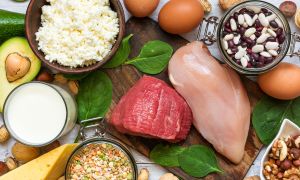Advertisement
Protein can be categorized into two types: complete and incomplete proteins. Proteins are made up of smaller units, called amino acids. Complete proteins contain all of the amino acids your body needs and include meat, fish, poultry, dairy, and soy products. Foods that are lacking or are very low in one or more essential amino acids are considered incomplete proteins. These foods include beans, grains, nuts, and vegetables.
Continue Learning about Protein
Important: This content reflects information from various individuals and organizations and may offer alternative or opposing points of view. It should not be used for medical advice, diagnosis or treatment. As always, you should consult with your healthcare provider about your specific health needs.






